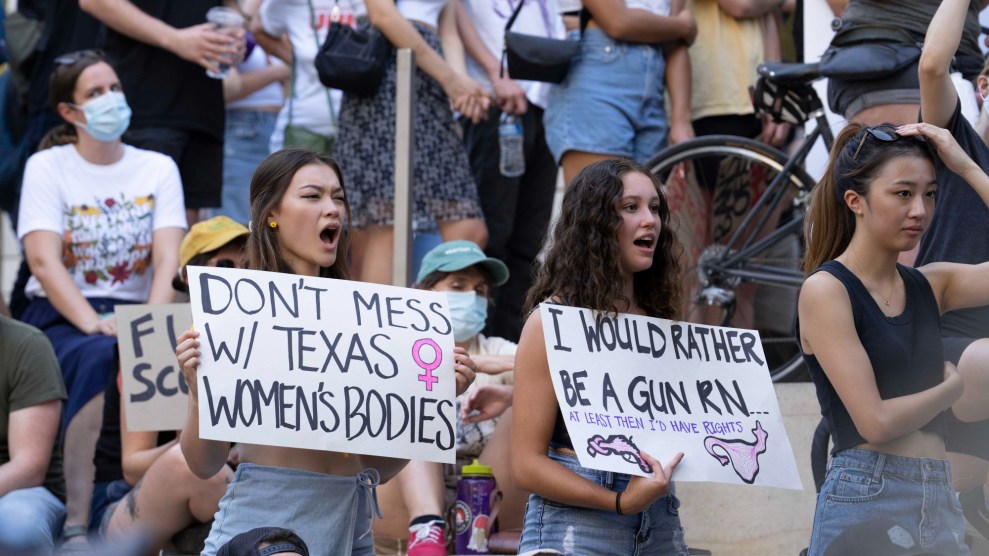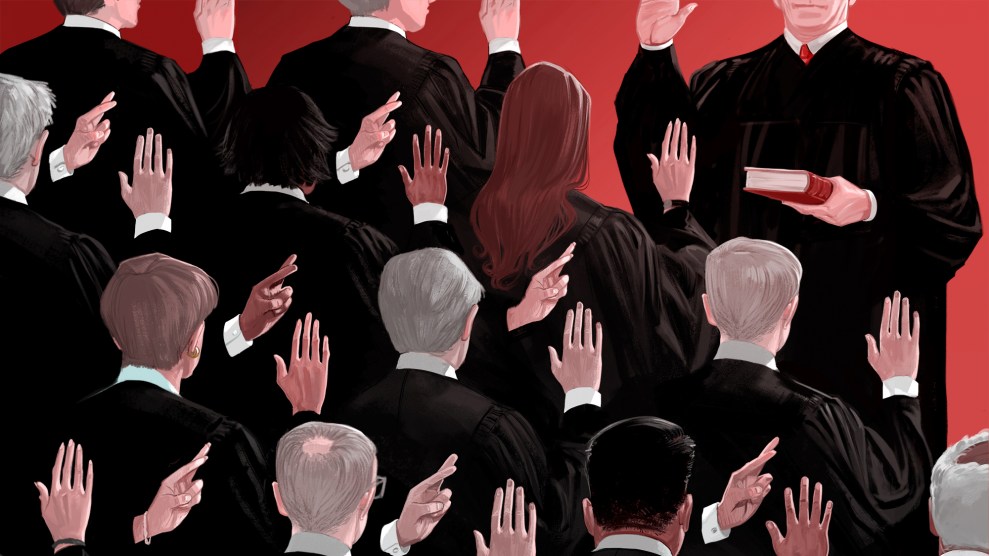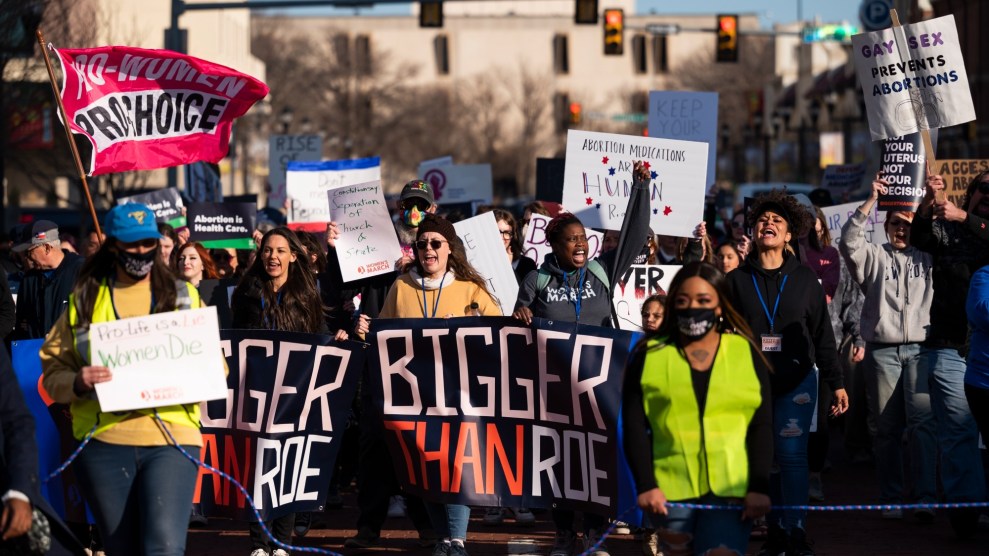
Texans rally in Austin to protest the US Supreme Court's decision overturning Roe v. Wade in 2022.Bob Daemmrich/Zuma
The city of Amarillo, in the Texas Panhandle, has emerged as one of the strongholds of the anti-abortion movement in that state and around the country, not least because its sole federal judge, a far-right Trump appointee, has been so willing to rubber-stamp conservative challenges to reproductive health options like the abortion pill and birth control for minors. So when far-right activists hatched a plan to put a local measure on the ballot that would have essentially prohibited anyone from using Amarillo roadways to travel for abortion, supporters assumed it would easily pass.
But on Tuesday, Amarillo voters surprised the prognosticators by resoundingly defeating the measure, Proposition A, 60 percent to 40 percent. It was a rare abortion-rights victory in one of the most abortion-restrictive states in the country—even as the overall results of the national elections were a disaster for the future of reproductive rights across the US, with Republicans now in control of the White House and Senate. The House of Representatives remains up for grabs.
The outcome in Amarillo is especially surprising considering the city’s staunchly conservative record: In the two counties that Amarillo encompasses, more than 70 percent of voters cast ballots for Donald Trump in Tuesday’s election.
But apparently the ban was too expansive even for some of those voters. It would have applied to any person who drives an abortion patient to an appointment using the city’s roads, or who provides financial assistance to anyone passing through the city to access out-of-state abortion care. Even someone simply offering directions to the nearest out-of-state clinic could be held accountable.
“This vote proves that when you actually sit down with people across the aisle, even those who are pro-life, and explain what these bans actually do in practice, they realize how harmful they are.”
“We are so unbelievably thrilled—and relieved,” Courtney Brown, co-founder of the Amarillo Reproductive Freedom Alliance, told me shortly after the vote totals came in. “This proves that when you actually sit down with people across the aisle, even those who are pro-life, and explain what these bans actually do in practice, they realize how harmful they are.”
The travel ban was the brainchild of two influential anti-abortion strategists: East Texas activist and pastor Mark Lee Dickson and former Texas solicitor general Jonathan Mitchell. Dickson is the leader of the so-called “sanctuary for the unborn” movement, which so far has persuaded about 80 local governments in seven states to pass ordinances prohibiting abortions within their jurisdictions. Mitchell is the architect of the state’s 2021 Senate Bill 8, also known as the Heartbeat Act, which prohibited abortions after six weeks of pregnancy and included a “bounty hunter” provision putting enforcement in the hands of private citizens rather than governments. SB8 played a critical role in helping overturn Roe v. Wade in 2022, after which Texas imposed a total abortion ban. The current law makes it a crime to provide abortions, with penalties up to life in prison and no exceptions for rape, incest, or life-ending fetal abnormalities.
But even with those draconian laws, Texans have continued to obtain abortions, either by purchasing abortion pills from online providers—illegal in the state but difficult to enforce—or by traveling out of state. According to the Guttmacher Institute, since 2023 some 35,000 Texas patients have been forced to trek elsewhere for the procedure—mostly to New Mexico and Colorado, where abortion remains legal throughout pregnancy, or to Kansas, where it’s legal until 22 weeks.
So Mitchell and Dickson mounted new attacks on several related fronts. They began pushing for local “abortion trafficking bans,” based on Dickson’s argument that “the unborn child is always taken against their will.” And they began looking for ways to revive the Comstock Act, an 1873 anti-vice statute that bars the “sending or receiving” of all abortion-related materials, including pills. The so-called “zombie law” couldn’t be enforced while Roe was in effect, but it was never repealed by Congress; resurrecting it would be tantamount to a national abortion ban.
Amarillo, located in the mostly rural Panhandle area of Texas, was seen as a “trophy” for anti-abortion advocates due to its prime location on Interstate 40—an hour’s drive to New Mexico, where more than 14,000 Texans sought abortion care last year, and a throughway to Colorado. With its proximity to abortion-legal states, Dickson told me in August he considers Amarillo to be the “abortion trafficking hub” of Texas.
Amarillo also happens to be the home of a federal court where Trump-appointed anti-abortion extremist Matthew J. Kacsmaryk is the sole judge—meaning that he decides any legal federal lawsuit filed there. Formerly an attorney for a Christian-right law firm, Kacsmaryk has a history of ruling against reproductive rights—helping propel a lawsuit against the FDA’s regulation of the abortion drug mifepristone to the Supreme Court; ruling that teenagers must have parental consent for prescription birth control; and calling the Victorian-era Comstock Act “important public policy” that should be interpreted “plainly.” Far-right litigants seeking to block Biden administration policies have come under fire for “judge shopping” in Kacsmaryk’s courtroom, knowing they can count on him to be on their side.
The measure was stunningly broad, banning not just the transport of abortion-seekers , but any conduct that knowingly “aids or abets an elective abortion” on any Amarillo resident, no matter where the procedure takes place.
The 18-page measure crafted by Dickson and Mitchell was stunningly broad, banning not just the transport of abortion-seekers in or through the city, but any conduct that knowingly “aids or abets an elective abortion” on any Amarillo resident, no matter where the procedure takes place. Borrowing from SB 8’s “bounty hunter” provision, the ordinance allows almost anyone to file a civil lawsuit to enforce the ban, with a potential payout of $10,000 in damages per violation, encouraging Texans to turn on each other.
Also tucked into the ordinance is a prohibition against the “possession or distribution” of abortion pills under the Comstock Act. Mitchell—the brains behind numerous anti-abortion lawsuits and intimidation tactics against abortion supporters—hoped that the ordinance could provide standing for the city to sue the FDA over its regulation of mifepristone after the Supreme Court threw out a case brought by anti-abortion doctors this past June.
First, Dickson and his allies tried to persuade Amarillo’s self-proclaimed “pro-life” City Council to pass the ordinance but failed by a 4-1 vote in June, with local leaders citing their lack of authority to regulate interstate travel. Anti-abortion activists then successfully moved to petition to add the ordinance to the November ballot, forcing the decision upon voters.
When Brown and five friends learned the abortion travel ban would be coming to their community, they immediately sprung into action, creating the grassroots Amarillo Reproductive Freedom Alliance in 2023. They spent the next year organizing in the community to convince conservative voters that the ban would not only infringe on bodily rights—but many other constitutional rights as well.
Dickson blames a “misinformation campaign” led by the group—and even the city’s conservative mayor—for the ban’s defeat and vowed not to give up. “Amarillo truly is the new Alamo for the pro-life movement in Texas,” he said in a statement. “The fight is far from over in the city of Amarillo.”
Meanwhile, Brown suspects Dickson and Mitchell will continue to push travel bans in towns near Amarillo and possibly elsewhere. “We are staying vigilant to protect the rights of other citizens around us, too,” she says. “We continue to be prepared to fight.”











